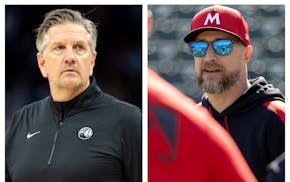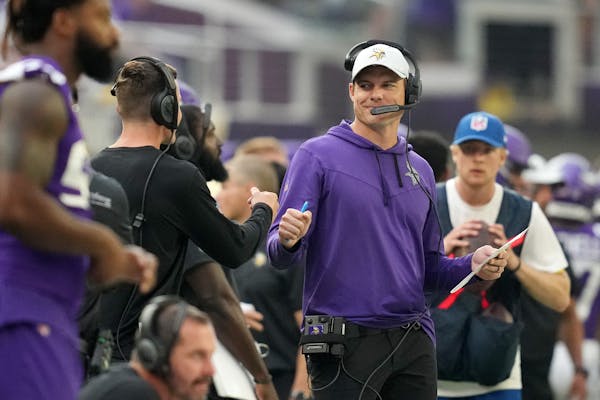If the NFL were capable of embarrassment, the league would send a refund to everyone who attended that "game" on Saturday night.
About 90 minutes before the "Vikings" "played" the "49ers," the Vikings released a list of 27 players who would not participate. That list included everyone you might want to see.
Imagine buying a ticket for the Rolling Stones, and having Mick Jagger and Keith Richards stay behind the curtain while the winners of a karaoke contest performed. That's what the NFL is selling you, if you are enough of a sucker to believe they care about entertaining you in August.
In a game missing only Spergon Wynn and Josh Freeman, the 49ers backups defeated the Vikings' backups 17-7 at U.S. Bank Stadium. A good time was had by none.
This was the second of three preseason games on the schedule, and it raised two questions: Why, and when?
Why are there three preseason games?
Everyone knows preseason games are a joke. Reducing the preseason from four games to three did not solve this problem; the reduction merely reminded us that we're not missing anything in that fourth game, and wouldn't be missing anything if another were dropped.
When will the NFL improve its impoverished bottom line by trading a preseason game for an 18th regular-season game?
That's where this is headed.
Two preseason games is still too many, and 18 regular-season games will increase injuries and risk that playoff teams will be damaged by those injuries.
So what's the best possible schedule for the league, the players and its fans?
The Vikings' joint practices with the 49ers this week provided a clue.
An 18-game schedule is dangerous for players, but there is a way of mitigating the risk. This is not a new idea, but it is the right idea: Schedule two bye weeks for recovery, and legislate that every player must miss at least one game, whether because of injury or decree.
Then every player would have at least three weeks of rest during a 20-week span. That's about as good a deal as the NFLPA is going to get.
Two preseason games will still be one, or two, too many.
What is accomplished in 2022 in preseason games? Coaches rest many of their key starters. They want to see their offensive and defensive lines play in live conditions, they want to test reserve or inexperienced quarterbacks, and they want to hold an open competition for the bottom of the roster and special teams positions.
They can do all of that in one game.
They can play their starters briefly, then let their reserves compete.
If they want to see their starters get more work, they can schedule joint practices.
The difference between preseason games and joint practices is that coaches generally feel more comfortable playing their starters in joint practices. NFL preseason games are scheduled by the league. Joint practices are scheduled by the teams, meaning coaches choose to work against coaches they trust, in a more controlled environment.
A defensive end trying to prove himself in a preseason game might flatten Vikings quarterback Kirk Cousins and end the Vikings' chances of competing. That's less likely to happen in a joint practice, because NFL players are accustomed to avoiding hitting quarterbacks in practice, and their coaching staff is on the field monitoring them.
On Tuesday, at the teams' first joint practice, Cousins worked with a true first-team offense, including running back Dalvin Cook and receivers Justin Jefferson, Adam Thielen and K.J. Osborn. That combination may never be seen in a preseason game, nor should it be.
Vikings coach Kevin O'Connell is right not to play his starters. The risk-reward ratio of putting key players into meaningless games is heavily weighted toward risk, and the "reward" was watching Kellen Mond throw awful passes against a third-team defense.
Just stop charging people good money and pretending you're going to put a representative product on the field. One preseason game would be more than enough.
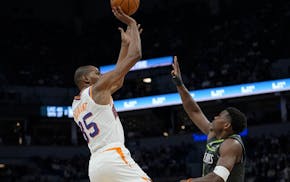
Souhan: Will the Wolves trade for Kevin Durant? Should they?
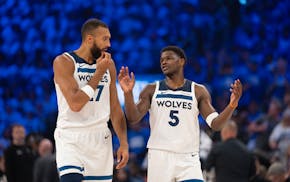
Souhan: If Edwards is a franchise player, he needs to act and play like it
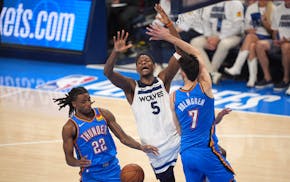
Souhan: Wolves' weak performance in Game 5 invites change, so don't let it shock you
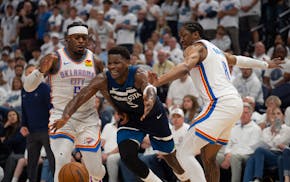
Souhan: Edwards and Randle flop in the Timberwolves' biggest game of the season
